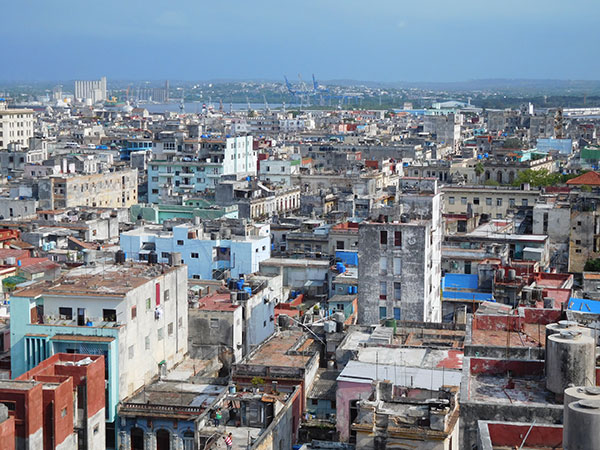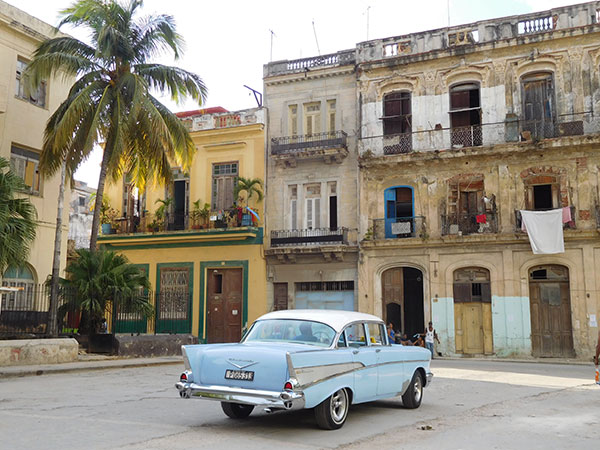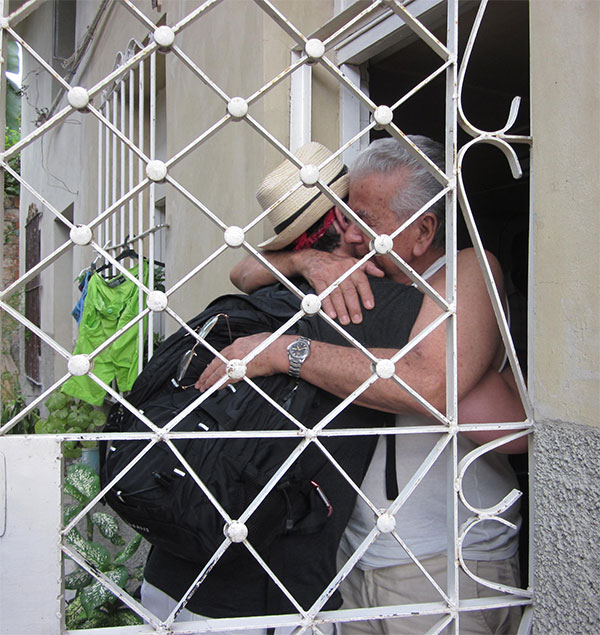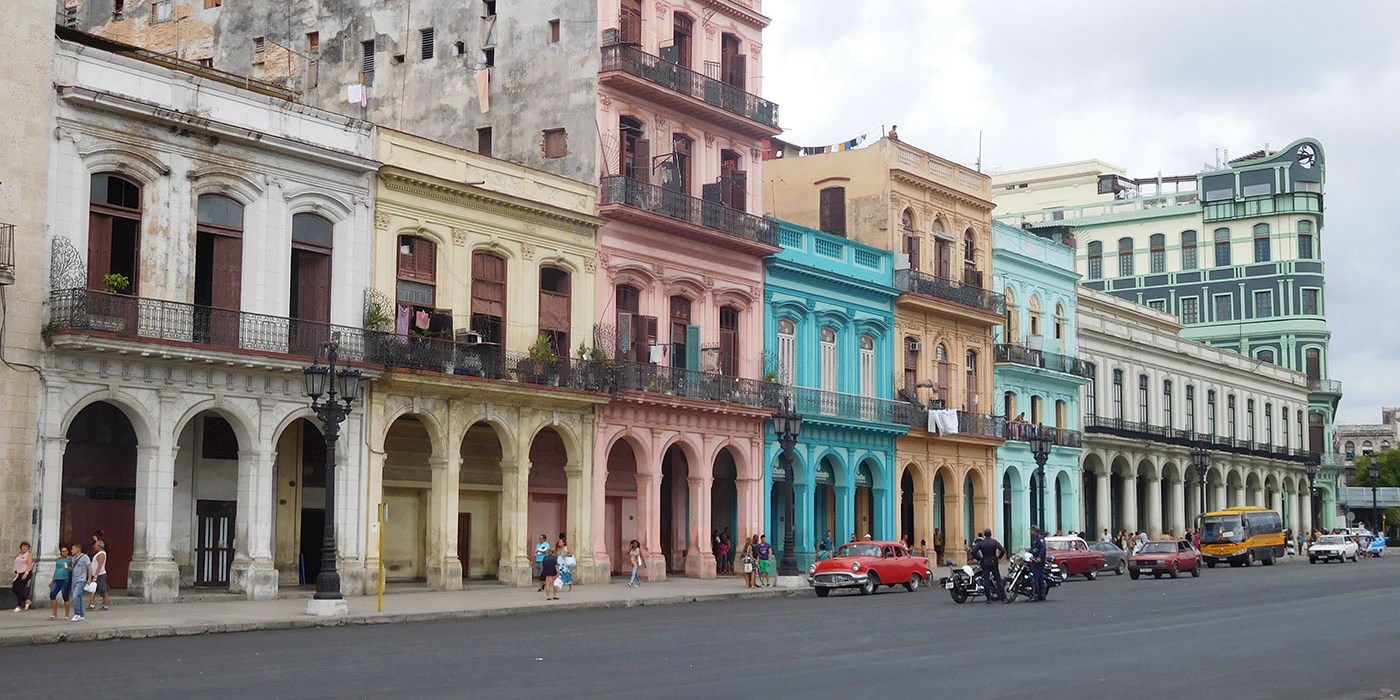The father has just ordered his 7- and 10-year-old sons lunch—sandwiches and sodas. Instead of eating, the carefree boys start to blow bubbles through their straws, giggling all the while. Their dad takes it all in. He can’t help noticing how much they look like him. Their dark eyes. Their thick, black hair. He wonders whether they’ll be like him when they’re men. He wonders if he’ll ever know.
It has been eight years since Fidel Castro led the 1959 revolution in Cuba. Soon afterwards, Castro, as prime minister, nationalized without compensation all American-based businesses in Cuba; in response to Castro’s reforms, the United States broke off diplomatic relations with Havana and imposed a trade embargo.

That changed life dramatically for Alfredo, his sons, and just about everyone on the Caribbean island. Daily necessities were always in short supply. A life of poverty became the norm, prompting citizens to flee whenever they could, some legally, others illegally. For those who stayed behind, like Alfredo, the future seemed grim. Alfredo didn’t want that future for his children. He had to get them off the island.
So a few months before, he signed away his parental rights, which was required when children were being taken out of Cuba without both of their birth parents. Before they boarded an Iberia Airlines flight bound for Madrid with their mother and stepfather,—Alfredo met them at Jose Marti International Airport in Havana to take his boys out for one last lunch together, knowing he might never see them again.
When the sandwiches and sodas are gone, Alfredo walks his boys to their gate, where his ex-wife and her new husband—a doctor he entrusted with raising his sons—are waiting. Alfredo isn’t one to cry, but as he hugs each of them goodbye, tears flow.
Growing Up an American
Half a century later, Alfredo, now 82, opens the door to his crumbling one-bedroom apartment in a decrepit neighborhood of Havana. There stands his 27-year-old grandson, whom he had never met. He weeps again. So do I.
Born and raised in Miami, I grew up on Saturday morning cartoons, Super Mario Brothers, and the Pledge of Allegiance. My favorite food is lasagna, my favorite sport baseball, and outside of a few cheeky idioms, English is my only language.
But some weekends, my brother and I climbed into my mother’s Toyota Camry and bobbed our heads to the conga drums that boomed out of our car’s speakers on our way to my maternal grandparents’ house. I ate black beans and rice at Thanksgiving dinner, helped roast an entire pig in a hole in the ground on Christmas Eve, and knew how to make a mean mojito before I was legally allowed to drink it.
So even though I’d never seen the island where my grandfather still lived, I knew it was my heritage.
I never asked my dad about Cuba, and he didn’t really talk about it; Cuba wasn’t his country anymore. The bits I knew about it were relegated to the crumbs my maternal grandparents brushed off from nostalgic dinner-table conversations—about the beaches where they swam and how dazzling Havana, “The Latin Las Vegas,” used to be.
After attending a performing arts high school in Miami, I enrolled at Carnegie Mellon University’s renowned School of Drama in fall 2006, earning my degree as an actor in 2010. While there, I never bumped into Kenya Dworkin y Méndez, professor of Hispanic studies. Too bad. Dworkin, a Cuban herself, born in Havana and raised in the States—has spent long hours preparing Cuba for the post-totalitarian future to (hopefully) come.
Much of her work has been alongside Robert Cavalier, through Carnegie Mellon’s Program for Deliberative Democracy (PDD), in which he is codirector. As he describes:
“We’ve run several workshops on the principles and practices of deliberative democracy for visitors from Cuba. They’ve grasped the value of providing citizens with well-designed and balanced background information and an opportunity to participate in structured, moderated conversations. They also understand the importance of creating the conditions for a robust civil society, and they are doing just that with their constitutional roundtables.”
In the roundtables, five to ten Cuban citizens gather in living rooms to discuss democratic concepts—things like the right to free speech or the right to publicly assemble—that are unfamiliar to Cubans. More than 500 different roundtables now take place twice a month in homes across the island.
“We’re preparing the Cuban citizens for political engagement so that when the time comes, they’re ready,” says Dworkin. “It’s totally grassroots—ordinary people, who are valiant … trying to educate one another and create some consensus about what kind of culture—and future—they want for their country.”
Dworkin says she realizes that “changing Cuba for Cubans will take time,” especially when it comes to politics. “You can’t just say, ‘Tomorrow we’re going to be a democracy,’ because no one knows how to function in a democracy. But the roundtables are a start because they teach the virtues of citizenship in the very process of developing the skills of deliberation.”
Although true democracy might take some time, recent developments between the United States and their Communist neighbor are encouraging. Just last month, Cuban President Raul Castro, the brother of Fidel, met privately with President Barack Obama at the U.N. General Assembly in New York. It was the first such sit-down between leaders of the two countries on American soil since the Cuban revolution. This comes less than a year after Obama and Castro announced on December 17, 2014, the beginning of a process of normalizing relations between Cuba and the United States.
On the island, the Cuban government has begun allowing its citizens to travel freely—a “release valve,” Dworkin says, which also conveniently allows dissidents and those unhappy with the status quo to leave permanently.
The government has also begun to loosen its grip on private enterprise. Previously, all businesses were state-owned and operated; now, small and particular private businesses are sanctioned—citizens can now rent their homes out to tourists, for instance, or sell fruit from carts on the street.
Although American citizens are not yet allowed to travel to Cuba for strictly tourism purposes, the White House has cut much of the red tape that was previously required.
The Road Not Taken
Hearing about the recent changes piqued my interest in returning to my roots. Where did I come from, exactly? What did my family leave behind? How differently would my life have turned out had Alfredo not hugged his sons goodbye?
I knew that Alfredo, now in his 80s with a failing heart, still lived in Havana. To me, though, he wasn’t a grandfather—he was just the man to whom my father regularly sent money and heart medication. We had never met, or spoken, and I knew him only as a photograph. I decided that should change.
My girlfriend and I bought our plane tickets, but I couldn’t convince either of my parents, both of Cuban descent, to join us; Cuba wasn’t their country anymore. The day before we departed, my maternal grandfather explained to us why his most recent trip to the island, in 1997, was his last: “Cuba is like a woman you fell in love with when you were very young. When you see her again, decades later, she’s grown wrinkled, and tired, and worn. … You remember the woman she was, but she’ll never be the same one you fell in love with.”
I had no such preconceived notions, and I had a paternal grandfather to meet.
Almost as soon as our plane takes off from Miami, our pilot announces that we’re beginning our final descent. It’s a shockingly short flight—45 minutes that covers 230 miles—roughly the distance between New York City and Washington, D.C.

It isn’t long after we arrive at our rental apartment in Central Havana that—miles notwithstanding—I realize how far I am from Miami. Pre-revolution 1950s American sedans rumble down narrow streets, and though some are in remarkable condition, most are rusty and spew clouds of black exhaust, fossilized reminders of what once was.
My girlfriend and I spend our first night walking Central Havana’s streets and peek inside the shutter of an apartment to sneak a glance at the life I could have lived. Lit by the glow of a blocky television, a family of six sits beneath a bare light bulb that hangs from their 14-foot ceiling. The flickering television provides just enough light for us to see the rotting, exposed wooden beams above them and the crumbling cement at the seams of the living room. I’d heard that building supplies and paint were scarce and expensive on the island, and I’m now witnessing, miles aside, what separates my two homelands: 56 years.
As we walk past pile after pile of rubble on the dilapidated streets, my girlfriend breaks her silence: “It’s like a fully populated abandoned city.” It’s true—the city’s former wealth seeps from the crumbling facades of its buildings and wafts from colonial-era arches. By now though, I’ve gone silent, overwhelmed by the stench of rotting garbage, the mange-ravaged dogs that trot by, and the faces, so many faces, of people I might have known.
We pass by a hotel, where there is a crowd—all Cubans, judging by their clothes—standing around the front steps, illuminated by the glow of smartphones. We pop inside and learn that the lobby has free Internet access. Suddenly, it dawns on us: The Cubans—who aren’t allowed inside the hotel—are all connected to its wi-fi. In a country where less than 5% of the population has access to the Internet, one must capitalize on these small gifts.
Some, I see, are tweeting, and I realize that the government, despite half a century of attempting to censor its citizens’ voices, can no longer hold back the hands of time. “The digital media is allowing us to talk to people there,” Dworkin later tells me. “It’s amazing how much information I can get about what’s going on there at a micro-level,” information broadcast by Cubans just like the ones hanging outside the hotel.
My girlfriend and I make our way to the iconic limestone seawall, called El Malecón. It runs for five miles along Havana’s coast, and its romantic edge draws tourists and vagabonds alike. We walk side by side, mesmerized by how stunning the city looks now that nighttime has hidden its decay.
The days and nights ahead make me reflect on what might have been had Alfredo not waved goodbye to my father. A sense of guilt sets in my bones. Guilt about what, I’m still not sure, maybe that I’m not Cuban—not anymore.
“Abuelo”
We climb out of the backseat of a 1980s Suzuki sedan and onto a crumbling sidewalk in Havana’s Luyanó neighborhood. It’s a hilly part of the city, one largely unseen by tourists—the government tries hard not to show you these parts of town. We walk through a rusted gate toward a decrepit two-story apartment building. I pull out a scrap of paper on which I had scribbled my grandfather’s address.
Whenever I had imagined this day, I saw myself excited, or panicked, or anything but frozen. Now, approaching his front door, I’m only numb, like that breath you don’t take before your feet hit ice water.
A young woman—likely a neighbor—looks at us, confused.
“Apartmento cuatro [Apartment 4]?” I ask. “Busco a Alfredo [I’m looking for Alfredo].”
She disappears around a corner, knocks on one of the doors, and blurts something in Spanish. Then, she reappears.
“Si! Apartmento cuatro [Yes! Apartment 4],” she says, and motions for us to walk in. I turn the corner and see a small, grinning man standing in the threshold of his front door.
The only word I can think to say escapes my lips:
“Abuelo [Grandfather]!”
His eyes grow wide. He grabs me and hugs me hard. I feel him start to cry, his breath heaving on my shoulder. Suddenly, I’m crying, too. After a few moments, we wipe our eyes and smile.
“Entra, chico, entra [“Enter, boy, enter]!”

He motions for my girlfriend and me to sit on the twin mattress that serves as both his couch and bed. I glance around the living room. It’s squat, no bigger than a large walk-in closet. The furniture is sparse—just a few chairs, a fan, and a small TV that rests on a short stand. A long scrap of fabric hangs from a branch, separating the living room from the rest of his home.
He stares at me for a few moments. “I was expecting a boy,” he finally says, handing over the most recent photograph he has of me, from my freshman year at CMU. I could tell it had been printed on an ancient laser printer—perhaps his neighbor’s. “You’re a man now. ...”
He says this all in Spanish, of course, and though I sometimes need my girlfriend to translate, I follow along as best I can. He settles back into a chair, and his best friend, a woman named Ana who works as his caretaker, settles into one across from us.
Before long, the conversation turns to his ailing health. He rattles off ailments like the names of friends he’s known forever. A busted hip. A failing pacemaker. Recently onset diabetes. On and on … until Ana flings open the door of a TV stand, revealing rows of white boxes and pills.
“These are all of his medications,” she says. “Do you know how much all of these cost? A three-month supply? $400.”
“And do you know how much my monthly pension is?” huffs my grandfather. “$10! $10!” he bellows, before breaking into a laugh. He manages, he says many Cubans do, on the money sent by relatives who’ve escaped the island.
He tells us about his life when he was my age, aboard ships in the Cuban merchant marine, the hours spent asking questions to the ocean, and the times he could have—should have—left.
“You travel all over the world. Don’t be stupid. Pick a place, and just stay there,” he recalls my grandmother telling him, long after they’d divorced. Alfredo had remarried by then and had a young daughter named Alina with his second wife. “If I defect, they’ll never let Alina leave,” he told her.
Because Alfredo stayed, Alina was able to eventually leave. Again, he had sacrificed himself for his children.
Through the living room window, I notice that the sun has started to set. Not wanting to find ourselves stuck at night without a taxi—they don’t pass through these parts of town after dark—we tell them we have to get going.
“Pues, Abuelo … nos vamos [Well, Grandfather …we’re going],” I tell him.
We hug.
“Te quiero [I love you],” I tell him.
“Te quiero, chico [I love you, boy],” he tells me. “Hasta luego... [Until next time ...].”
It feels awkward, and awful, and strange to say goodbye, but our silence has been broken.
I know it will be just the first of many more conversations with my grandfather.
I also know that democracy can’t come soon enough to Cuba, and I’m proud that my alma mater, through the Program for Deliberative Democracy, is playing a role in helping the citizenry prepare for that day.
Footnotes
Photos and video by Nicholas Ducassi and Adriana DeGirolami




